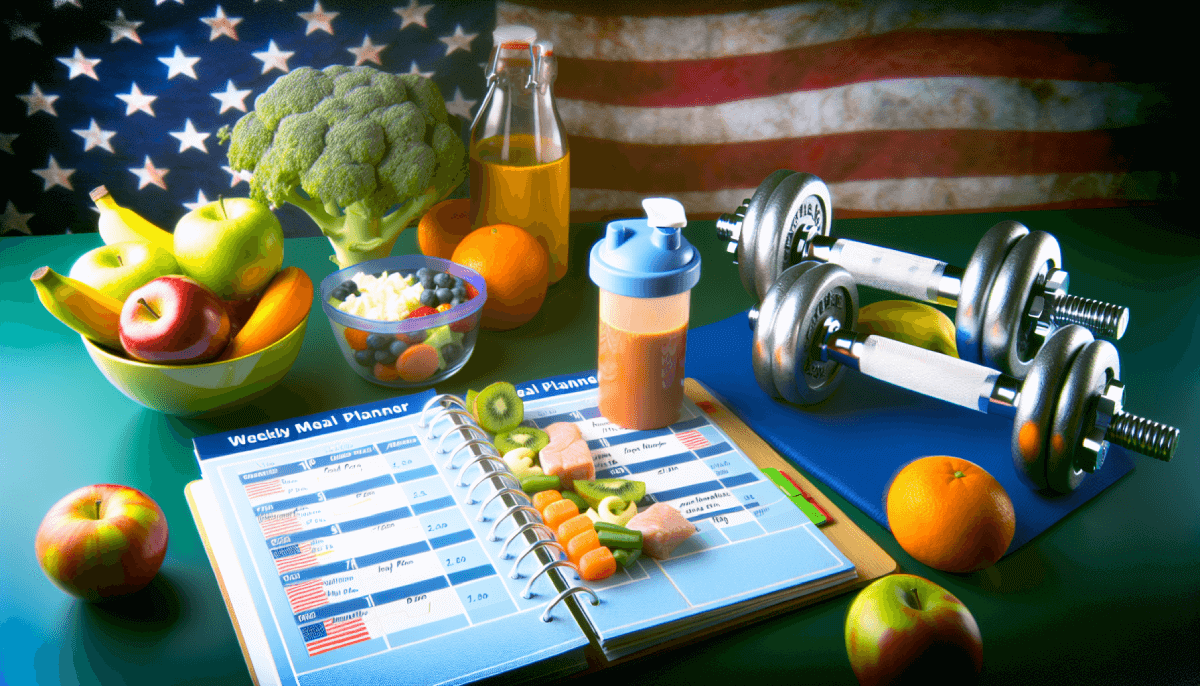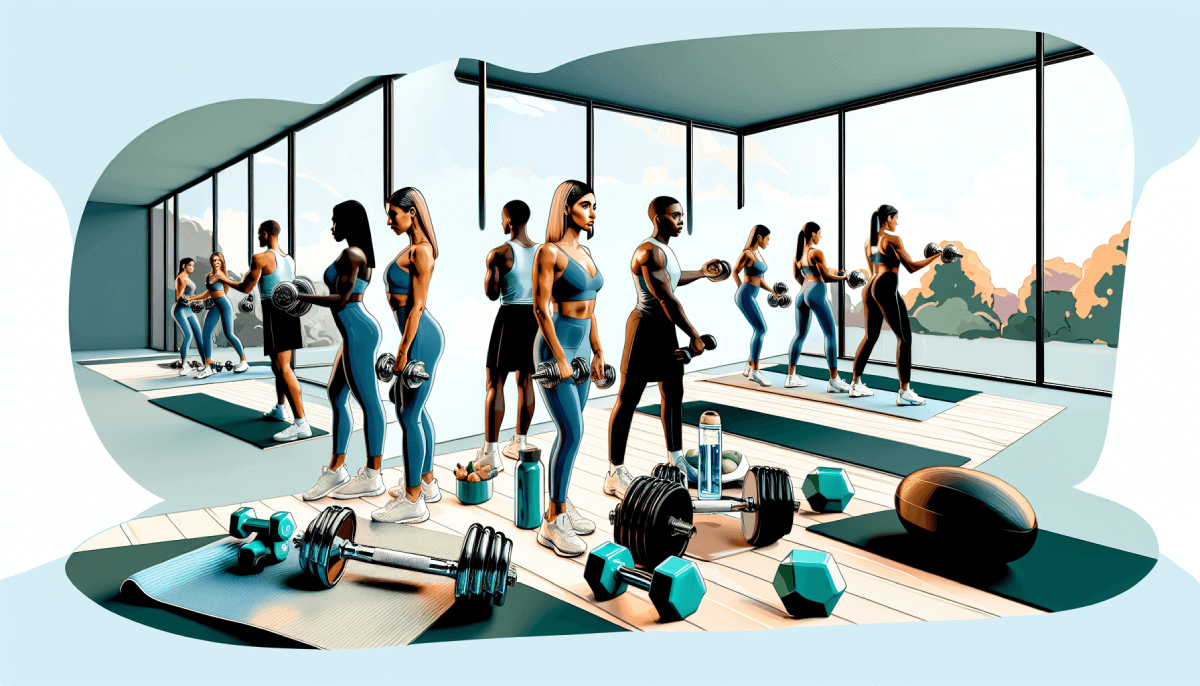Planning your meals for the week can be a game-changer, especially if you are dedicated to dumbbell workouts. A weekly meal planner helps you stay organized, saves you time, and ensures you are eating the right foods to support your fitness goals. By planning ahead, you can reduce food waste, stick to your budget, and make healthier choices. This is particularly beneficial if you’re following a dumbbell workout plan.
In this article, we will explore the benefits of meal planning, provide tips on creating a meal plan for weight loss, and offer sample healthy meal plans specifically for those who love dumbbell workouts. We will also share some practical advice on grocery shopping on a budget and how meal planning can enhance your workout performance and recovery. Additionally, we’ll look at how meal prep for weight loss can be integrated into your routine.
Benefits of a Weekly Meal Planner
A weekly meal planner can make your life much easier. Here are some key benefits:
- Streamlined Grocery Shopping: With a meal plan, you know exactly what you need to buy, which saves you time and reduces the number of trips to the store.
- Efficient Meal Prep: Preparing meals in advance can save you a lot of time during the week. You can cook in bulk and have meals ready to go.
- Supports Fitness Goals: By planning your meals, you can ensure you are eating the right balance of nutrients to support your workouts and recovery. For more on the benefits of strength training, check out 14 Benefits of Strength Training.
- Reduces Food Waste: When you plan your meals, you only buy what you need, which helps cut down on food waste.
- Saves Money: Meal planning can help you stick to a budget by avoiding impulse purchases and making the most of sales and discounts. This is especially true when grocery shopping on a budget.
For more information on the advantages of meal prep, check out the Meal Prep Guide – The Nutrition Source.
How to Create a Meal Plan for Weight Loss
Creating a meal plan tailored to weight loss goals is crucial for success. A well-thought-out meal plan helps you stay on track, avoid unhealthy choices, and ensure you get the nutrients your body needs. Here are some tips to help you get started:
- Select Nutrient-Dense Foods: Focus on foods that are rich in vitamins, minerals, and other essential nutrients. Include plenty of vegetables, fruits, lean proteins, and whole grains in your diet.
- Portion Control: Be mindful of portion sizes to avoid overeating. Using smaller plates and measuring portions can help you stay within your calorie limits.
- Balanced Nutrition: Ensure your meals are well-balanced. Include a mix of protein, carbohydrates, and healthy fats in each meal. For more information on balanced nutrition, check out the Balanced Diet: What Is It and How to Achieve It guide.
- Meal Prep: Prepare meals in advance to save time and reduce the temptation to opt for unhealthy options. Batch cooking and pre-portioning meals can make it easier to stick to your plan, making meal prep for weight loss more effective.
- Hydration: Don’t forget to stay hydrated. Drinking plenty of water can help control hunger and support overall health.
Healthy Meal Plans for Dumbbell Enthusiasts
For those who engage in regular dumbbell workouts, it’s important to have a meal plan that supports muscle growth and recovery. Here are some sample meal plans to help you get started:
Breakfast
- Oatmeal with fresh berries and a scoop of protein powder
- Greek yogurt parfait with granola and honey
- Scrambled eggs with spinach and whole-grain toast
Lunch
- Grilled chicken salad with mixed greens, avocado, and a light vinaigrette
- Quinoa bowl with black beans, corn, and diced tomatoes
- Turkey and avocado wrap with a side of baby carrots
Dinner
- Baked salmon with roasted sweet potatoes and steamed broccoli
- Stir-fried tofu with mixed vegetables and brown rice
- Lean beef stir-fry with bell peppers and snap peas
Snacks
- Apple slices with almond butter
- Hummus with cucumber and carrot sticks
- Cottage cheese with pineapple chunks
By following these meal plans, you can ensure your body gets the nutrients it needs to support your workouts and achieve optimal results.
Tips for Grocery Shopping on a Budget
Shopping for groceries doesn’t have to break the bank. With a few smart strategies, you can get everything you need for your weekly meal planner without overspending. Here are some practical tips to help you save money:
- Make a list: Plan your meals for the week and write down all the ingredients you need. Stick to this list to avoid impulse buys.
- Buy in bulk: Items like grains, nuts, and seeds are often cheaper when bought in larger quantities.
- Shop seasonal produce: Fruits and vegetables that are in season are usually more affordable and fresher.
- Use coupons and discounts: Look for deals, coupons, and store discounts to save on your grocery bill.
- Opt for generic brands: Store brands often offer the same quality as name brands but at a lower price.
- Avoid pre-packaged foods: Pre-cut or pre-packaged items are usually more expensive. Buy whole foods and prepare them yourself. This approach not only supports healthy meals on a budget but also encourages healthier eating habits.
For more expert tips on grocery shopping on a budget, check out this guide from Cleveland Clinic.
Meal Planning for Optimal Dumbbell Workout Results
Meal planning is crucial for anyone looking to get the most out of their dumbbell workouts. Proper nutrition can enhance your performance and speed up recovery. Here are some tips to help you plan your meals effectively:
- Timing is key: Eat a balanced meal with carbs and protein about 2-3 hours before your workout. Post-workout, have a protein-rich snack within 30 minutes to aid muscle recovery.
- Incorporate protein-rich foods: Protein is essential for muscle repair and growth. Include sources like lean meats, eggs, beans, and dairy in your meals. For more on the importance of weightlifting, check out Why Everyone Should Weightlift.
- Stay hydrated: Drink plenty of water throughout the day, especially before and after your workouts.
- Balance your macros: Ensure your meals have a good mix of carbohydrates, proteins, and fats to fuel your workouts and recovery.
- Plan for variety: Eating a variety of foods ensures you get all the necessary nutrients. Rotate different protein sources, vegetables, and grains in your meal plan.
By following these tips, you can create a meal plan that supports your dumbbell workouts and helps you achieve your fitness goals. Remember, consistency is key, so stick to your plan and adjust as needed based on your progress and how your body feels.
Conclusion
Using a weekly meal planner can make a significant difference in your fitness journey, especially if you’re focused on dumbbell workouts. By planning your meals, you can:
- Save time and reduce stress
- Minimize food waste
- Support your fitness goals with balanced nutrition
- Streamline grocery shopping and meal prep
Whether you’re aiming for weight loss or muscle growth, a well-structured meal plan can provide the necessary nutrients and energy for optimal workout performance and recovery.
We encourage you to explore more dumbbell workouts and health information on Dumbbells.com to continue your fitness journey with confidence and knowledge. For expert opinions on the value of dumbbells, check out Are Dumbbells Worth It? Experts Weigh In.




